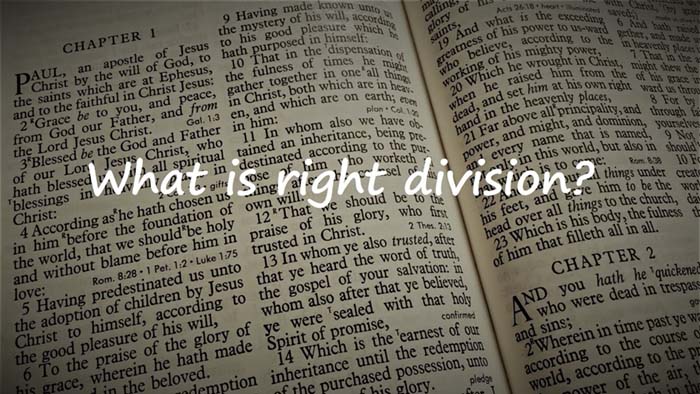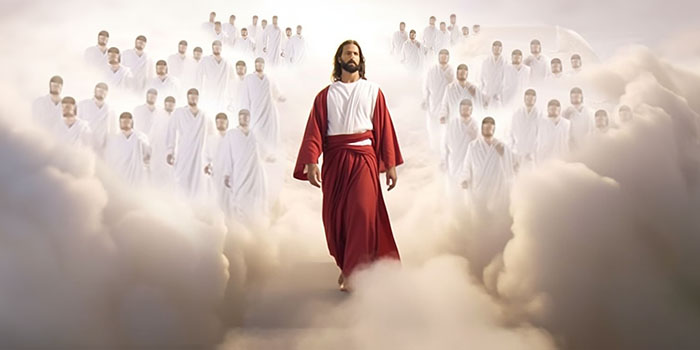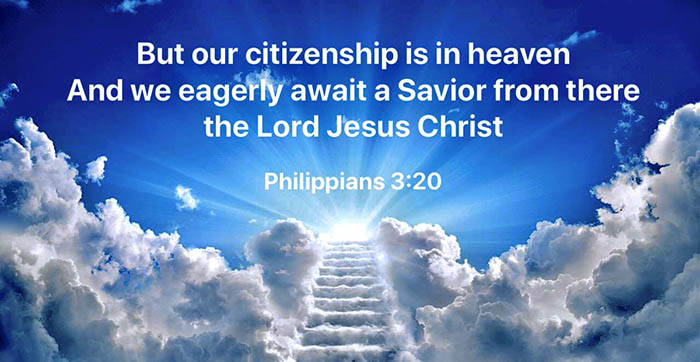Things That Differ
The One Great Requirement of the Word:
"Rightly Dividing" It.
The one great requirement of the Word is grounded on the fact that it is "the Word of Truth." And this fact is so stated as to imply that, unless the Word is thus rightly divided, we shall not get "truth"; and that we shall get its truth only in proportion to the measure in which we divide it rightly.
Ephesians 1:18
The eyes of your understanding being enlightened;
that ye may know what is the hope of his calling,
and what the riches of the glory of his inheritance in the saints,
It is an amazing thing to discover that even when the distinctive nature of The Dispensation of The Mystery has been seen, there are some who go back to 1 Thessalonians Chapter 4 for the revelation of their hope. In the nature of things, The Hope of any calling must be in agreement with its peculiarities of sphere and constitution, and it is therefore impossible that The Hope of Israel should also be The Blessed Hope of The Church of The Mystery. It may, of course, be objected that 1 Thessalonians 4 does not represent The Hope of Israel. This, therefore, we must examine.
The Acts of The Apostles opens with The Hope of Israel (Acts 1:6; Acts 3:19-26) and closes with The Hope of Israel in Acts 28:20. This Hope, therefore, is in operation throughout the whole Book and period. It is outside the scope of this teaching to do more than point out simple facts, and we will therefore deal only with The Hope of the Church at the time when Paul wrote the Epistle to the Romans. This must, however, be identical to The Hope of all other churches that came under the same dispensation.
The reader has only to turn to Isaiah 11:1-16 to which Acts refers as The Hope of Israel, to prove beyond the possibility of doubt that The Hope of the "Church" in Rome at this time was Millennial. The reference to the Archangel in 1 Thess. 4:16 makes another link with Israel, as does the connecting passage in 2 Thess. 2:3-10 where the Man of Sin is spoken of. In 1 Cor. 1:7, the "Coming" of The Lord is actually the "Revelation" or "Apocalypse."
The Hope of The Church of The Mystery must be the realization of the calling that places it far above all principalities at the right hand of God, a Hope that is far removed from Isaiah 11:1-16. It is set forth in Col. 3:4, where it is associated with The Manifestation in Glory when Christ Himself shall be made manifest.
The Hope of any company of believers must, of necessity, be the realization of their calling. It is obvious that The Calling of The Church in Ephesians differs materially in sphere, constitution, and destiny from that of the Church at Rome, Thessalonica, Corinth, or anywhere during the time of the Book of Acts. The Hope of these churches must be the fruition of the covenants that were then in force, namely, the covenant with Abraham and the new covenant with Israel and Judah. Members of The Church of The Mystery are taught to set their minds on things above and that their Hope is that when Christ shall be Manifested, they will be there with Him, not in the air or in the New Jerusalem, but "in Glory."
Ephesians 2:8
For by grace are ye saved through faith; and that not of yourselves: it is the gift of God:
The widespread notion is that one can go to heaven by keeping the law, especially the Ten Commandments. But the law was not given to any people who had heaven for their hope. It was given to Israel, God's chosen people. They have their future on earth, not in heaven.
The law was not given to save but to convict folks of sin. It is like a mirror. You look into it and see how bad you are. You can no more cleanse yourself by the law than you can cleanse your face with the mirror.
"Now we know that what things soever the law saith, it saith unto them who are under the law: that every mouth may be stopped, and all the world may become guilty before God" (Rom. 3:19).
Note that this is for those under the law, not for unbelievers who disregard the laws of God. And why do unbelievers resist the law?
"The carnal mind is enmity against God; for it is not subject to the law of God, neither indeed can be" (Rom. 8:7).
The law was added because of the great transgression, the idol in the wilderness. But it was given by grace, for it was to convict people of their sins and to turn them to Christ. So, the law was given that they might know sin and recognize it in themselves.
It can benefit us today to read about these people, their failures, even under the law, and the One Who came and fulfilled all the requirements of that law and then gave His Life as payment so that they might turn to Him and be saved by Grace.
Moreover, the law could not give life, no one could be justified by its deeds, and it could not give righteousness. But Christ can do all this and more. In the secret revealed to us today, we find that He can seat us together with Him at the Right Hand of God till He is Manifested in The Heavenly Places.
Again, we must note that the law could not give life. Death must be reckoned with. But there is a law in Romans 2:14, which is even today found in man.
One who believes and has the "new nature" does by this "new nature" the things contained in the law (and even more).
In Romans 6:3-5, baptism was known, and so they knew to consider the blessed fact of dying with Christ, being buried with Him, and being raised with Him to walk in the newness of life. It was the goodness of God that brought them to repentance.
The member of The Church, which is The Body of Christ today, enjoys a further identification with Christ, quickened, raised, and seated with Him in Heavenly Places. This identification is a far better incentive and more powerful than being under the law. So grace can bring about what the law cannot accomplish.
"For the grace of God that bringeth salvation, hath appeared to all men, teaching us that, denying ungodliness and worldly lusts, we should live soberly, righteously, and godly, in this present world;" (Titus 2:11-12).
And the next verse...
"Looking for that blessed hope, and the glorious appearing of the great God and our Saviour Jesus Christ;" (Titus 2:13)
Philippians 3:20
For our conversation is in heaven; from whence also we look for the Saviour, the Lord Jesus Christ
Ephesians tells us of the Great Salvation that is a part of The Dispensation of The Mystery. But in Philippians, we are told to work out that salvation with fear and trembling. So then, Ephesians tells us what we are in Christ, but Philippians tells us what we can do with Christ in us.
One of the things that date the Epistle of Phillippians is the mention of Epaphroditus and his illness. Before the end of Acts, Paul could heal all that came to him and even sent articles of his clothing to others who could not make the journey, and upon receiving them, they were healed (Acts 19:11-12). But that sign-gift was available only until Acts 28:28 and was ended as there was no healing from Paul for Epaphroditus or anyone else.
Another thing that dates it is the confession in Chapter 3 that the things which were counted as profitable in the flesh during the Apostolic administration are no longer a ground of confidence but thrown away as trash (Phil. 3:4-8). All the advantages of Israel in the flesh have passed off the scene.
In Phil. 3:11, we find Paul yearning for a resurrection, but before the end of Acts, he was expecting to be here and alive when the Lord came to set up His Kingdom (1 Thes. 4:15). So the Dispensational Frontier had passed, and the coming of the Lord postponed for about Two days (Hosea 6:2, 2 Pet. 3:8), and Paul knew this.
In Phil. 3:20 Paul reminds us that our conversation (citizenship) is in The Heaven of heavens and that it is from this citizenship location that we look for the appearing or manifestation of the Savior, the Lord Christ Jesus. So then, unlike Israel, who will look for Him coming in clouds to the earth, we look for His Manifestation or Coronation in the heavens.
In the past dispensation, men were taught to pray and expect an answer to prayer or to have it done as asked. But that is no longer in order, for here in Philippians, we are to pray thusly;
"The Lord is at hand (His Manifestation could be at any moment), be careful for nothing; but in every thing by prayer and supplication with thanksgiving let your requests be made known unto God. And the peace of God, which passeth all understanding, shall keep your hearts and minds through Christ Jesus." (Philippians 4:5-7)
How different from the so-called Lord's prayer in Matthew;
"After this manner therefore pray ye: Our Father which art in heaven, Hallowed be thy name. Thy kingdom come. Thy will be done in earth, as it is in heaven. Give us this day our daily bread. And forgive us our debts, as we forgive our debtors. And lead us not into temptation, but deliver us from evil: For Thine is the kingdom, and the power, and the glory, for ever. Amen." (Matthew 6:9-13)
The fact that Paul refers to the Praetorian guard in Phil. 1:13 and then expects to be released (his salvation) Phil. 1:19 shows that he was in Rome. This is further shown by the fact that many of Caesar's household were slaves if not all of them. God had put Paul in such a position that he could contact the members of the household of Caesar and give them the good news of The Dispensation of The Mystery.
It might be well for the reader to outline the seven steps in the Lord's humiliation in Chapter 2 and then the seven steps of exaltation which follow.
In chapter 3, Paul gives the seven things which he once thought were an advantage and the seven things he wins in the renunciation of all advantages of the flesh.
Then outline the examples of both Timothy and Epaphroditus, who labored with Paul. See the complaint even then of the lack of those who put Christ first.




